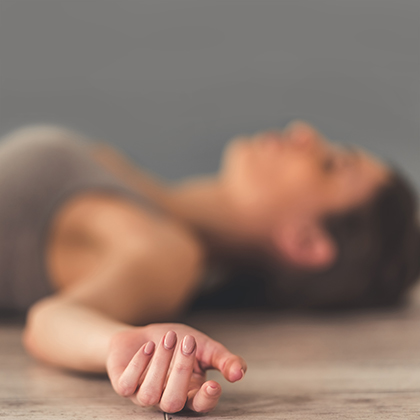I Occasionally Get Faint
Fainting (syncope, passing out) can be caused by a variety of situations, for example, pregnancy, medications, diabetes, anemia, heart conditions, age, and electrolyte imbalances. The person who has fainted doesn't know that they have passed out. Signs and symptoms of fainting include weak, lightheaded, sweaty, vertigo, and hearing sensations. Treatment for fainting depends on the cause.

Sensations
Fact Checked
by Daniel Sher, MA, Clin Psychology and Micah Abraham, BSc
Last updated November 25, 2020
A common symptom of anxiety is a feeling that your mind isn't working properly. However, you may also experience symptoms in your body - you may feel physically weak, as though feinting is imminent, for example.
Good balance helps you walk without staggering, get up from a chair without falling, climb stairs without tripping, and bend over without falling. Good balance is important to help you get around, stay independent, and carry out daily activities. Balance disorders are one reason older people fall. Learn more about falls and falls prevention. I sometimes get a split second feeling of dizzyness, feel slightly faint, and it comes with what feels like a head or adrenaline rush. It lasts seconds, can sometimes feel like I'm falling depending on what I'm doing.
Unfortunately, lightheadedness is also one of the most common symptoms of anxiety, especially during anxiety attacks. What's causing this lightheadedness, and - perhaps more importantly - what can you do to stop it?
How to Tell if You Have Anxiety Lightheadedness
One of the problems with intense anxiety is that it can be hard to tell the difference between anxiety and a different underlying medical condition. Unfortunately, certain medical conditions (including neurological or cardiac issues) might produce symptoms that closely resemble those of an anxiety disorder. For this reason, it’s important to be seen by a doctor who can rule out possible underlying medical conditions.
Hyperventilation and Feeling Light Headed
In people with anxiety, lightheadedness is often attributable to hyperventilation.

When your body experiences anxiety, it triggers the fight or flight system, which is the reflex designed to prepare your body for rapid action in order to evade threats. One of the symptoms is breathing rapidly. It's not 100% clear why breathing fast is advantageous from a biological perspective, but the most likely reasons include:
- Breathing quickly helps your heart move blood around the important muscles and organs.
- Breathing quickly reduces carbon dioxide in the bloodstream so that when you start to run you can handle the creation of more Co2.
That latter point is important. Studies have shown that by hyperventilating and depleting yourself of carbon dioxide, you can do things like hold your breath for longer, and potentially run away from predators or other threats. (Note: There are dangers to hyperventilating on purpose, so don't try it).
People often mistake hyperventilation for breathing too little oxygen. However, the opposite is true. In reality, hyperventilation is the act of breathing out too much carbon dioxide. Every time you exhale you breathe out Co2, and when you exhale too quickly, you breathe out more than you create. Eventually, your body is left with too little carbon dioxide in the bloodstream as a result of hyperventilation.
Your body needs carbon dioxide to work properly. Among many of the symptoms of overly oxygenated blood, low Co2 levels reduce blood flow to the brain and force the heart to work harder. This is one of the main reasons you start to feel light headed - because your body starts to feel as if it needs to fall to the ground to make it easier for blood to reach your brain. Fainting as a result of hyperventilation is rare, because blood flow doesn't stop entirely, but it does come close and causes your whole body to feel weak.
Other Causes of Lightheadedness
Lightheadedness may also be a perceived symptom. During anxiety attacks, weakness around the body is common, and it can be hard to hold on to thoughts. The body may also use up a lot of its energy and cause you to feel weak from head to toe. It is also possible to develop tunnel vision as a result of blood flowing away from the eyes and towards the muscles. All of these types of symptoms can create this feeling as though your body is getting ready to collapse.
Lightheadedness is a complicated feeling, and sometimes the causes aren't exactly clear. Even the reason that the human body hyperventilates when you experience anxiety isn't abundantly obvious, and the above ideas are just theories. But lightheadedness is most certainly a common anxiety symptom.
Fear Compounding Fear
Making matters worse is that the feeling of lightheadedness can cause fear. It's not uncommon, during the height of anxiety when your heart is beating quickly and your mind is going a mile a minute, to interpret your lightheadedness is a sign that you're about to die of suffer some sort of serious medical ailment. In other words, you may assume that something terrible is happening to you, from a medical perspective.
This type of reaction can create even more fear, making it much harder to control your anxiety and prevent it from spiraling out of control.

How to Stop Lightheadedness

Remember, lightheadedness is incredibly common because anxiety is incredibly common; and health anxiety is an anxiety symptom itself, so it's not at all unusual to believe something may be wrong with your health. For this reason, having a check-up with a doctor is a good idea. If a medical condition is causing your symptoms, a doctor can assess you and guide you in getting treatment. If your symptoms are not being caused by a medical condition, it can be reassuring to hear this from a doctor and you may find that this brings you some peace of mind.
Why Do I Faint Occasionally

Apart from seeing a doctor to rule out any possible medical issues, you can try the following to get rid of anxiety related lightheadedness:
How Do I Faint
- Breathe Better Easily the most important thing you can do is slow down your breathing. Remember, hyperventilation makes you feel like you need to take in more oxygen than you do. Try to regain some of your carbon dioxide by slowing down your breathing rate. Try to take slow, controlled breaths that last about 15 seconds, and hold your breath for a couple of seconds (at most) between the inhalation and exhalation. If it feels excessively uncomfortable to hold your breath, then rather focus on slowing the rate of your breathing.
- Walk Walking improves blood flow and reduces feelings of muscular weakness. Many people want to stay in one place when they're feeling this way because they're worried they're going to fall. But walking around can help you rebalance your carbon dioxide levels and improve blood flow around your body, reducing the likelihood of lightheadedness.
- Drink Water Another important thing to remember is that not all lightheadedness is related to anxiety. For example, dehydration can cause very mild lightheadedness, and anxiety can cause you to notice that lightheadedness more and interpret it as being something more serious. So, make sure you're avoiding anything that causes lightheadedness on its own, like getting up too fast, being excessively hungry, and of course dehydration.
These strategies may prove helpful in reducing your lightheadedness. However, if you want to address the problem at its root, it’s advisable to find ways to prevent the anxiety that’s causing the hyperventilation and lightheadedness in the first place.
Effective treatments for anxiety include cognitive behavioral therapy, some medications (speak to your doctor or psychiatrist), and several self-help techniques, such as deep breathing. Exercise is also important.
Anxiety is a treatable condition, and if you have been feeling lightheaded often as a result of anxiety, it is important to seek help. Research local therapists in your area and start finding out more about the lifestyle changes you can integrate. Once you take that first step, overcoming your anxiety is likely to become that much easier.
🍪 Pssst, we have Cookies!
We use Cookies to give you the best online experience. More information can be found here. By continuing you accept the use of Cookies in accordance with our Cookie Policy.